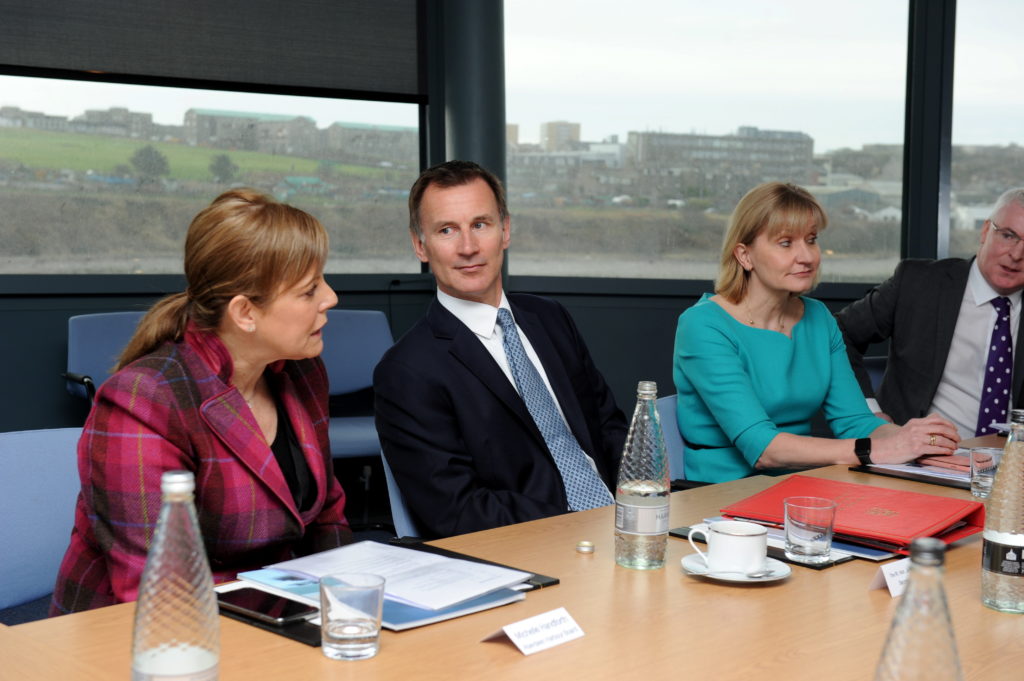
Tensions in the Gulf make the case for strengthening the Royal Navy, Foreign Secretary Jeremy Hunt said.
The Tory leadership hopeful said “we have run down the navy too much” in recent decades.
Mr Hunt, the son of an admiral, promised to add more warships to the fleet if he entered Number 10.
His comments came after it emerged a Royal Navy warship drove off Iranian patrol boats as they attempted to impede the progress of a British oil tanker through the Strait of Hormuz.
Meanwhile police in Gibraltar have arrested the captain and chief officer of the Iranian supertanker detained last week in an operation involving British Royal Marines.
Writing in the Daily Telegraph, Mr Hunt said: “Three vessels from a foreign military power tried to seize a British ship conducting its rightful business.
“The simplicity of these words belies the incredible menace behind Iran’s actions. Not for the first time, Britain’s interests were defended by the Royal Navy.”
Mr Hunt, who has pledged to increase defence spending from 2% of GDP to 2.5%, at a cost of around £12 billion a year extra in 2023, indicated that extra ships and more jets for the Royal Navy’s new aircraft carriers could be part of his plans.
“When you look at this week’s events it shows that in recent decades we have run down the navy too much,” he said.
“Our current commitment is for 19 destroyers and frigates, supported by excellent offshore patrol vessels.
“If I become prime minister, I will review this commitment as part of a wider look at our defence capability.”
Mr Hunt’s rival Boris Johnson said the UK would remain “very, very tough on Iran”.
Asked if he would bolster the naval presence in the region he told PA: “I think it is very important that UK vessels should be able to use international shipping lanes.”
Iranian President Hassan Rouhani has warned of unspecified “repercussions” for the seizure of the Grace 1 tanker off Gibraltar last Thursday.
In London, ministers urged Tehran to “de-escalate” the situation in the Gulf.
But the arrest of the ship’s officers of the Grace 1 in relation to suspected violations of EU sanctions on Syria is likely to exacerbate the already heightened tensions in the region.
In a statement, the Royal Gibraltar Police said the arrests followed a “protracted” search of the vessel, which remains in detention, during which documents and electronic devices were seized.
Earlier the Ministry of Defence confirmed the Type 23 frigate HMS Montrose had been forced to intervene when three Iranian fast patrols attempted to “impede” the passage of the BP-operated tanker British Heritage.
According to US media reports, a US military aircraft was in in the region and took video footage of the incident in which the Montrose was reported to have trained its guns on the Iranian boats.
A MoD spokesman said: “HMS Montrose was forced to position herself between the Iranian vessels and British Heritage and issue verbal warnings to the Iranian vessels, which then turned away.”
“We are concerned by this action and continue to urge the Iranian authorities to de-escalate the situation in the region.”
The Iranian Revolutionary Guard, which is thought to have been operating the patrol boats, denied the incident, saying if it had received orders to seize any ships it would have done so immediately.
Iranian foreign minister Mohammad Javad Zarif also dismissed the British account as “worthless”, saying the claims were being made to “create tension”.
The clash happened after the Department for Transport this week raised its security level for British shipping sailing in Iranian waters to its highest level, level three, meaning an incident is considered to be imminent.
Vessels were advised to take enhanced security measures and to avoid transiting through Iranian waters if at all possible.
As well as the Montrose, the Navy has four mine countermeasures vessels and the Royal Fleet Auxiliary Cardigan Bay logistics ship in the region.
With typically between 15 and 30 British-flagged merchant ships in Gulf waters on any one day, providing individual escorts has been ruled out.
The latest incidents come at a particularly sensitive time as tensions between the US and Iran have been ratcheting up over the unravelling of the Iran nuclear deal, which President Donald Trump withdrew from last year.
The European parties to the agreement, including the UK, earlier this week expressed “deep concern that Iran had begun enriching uranium to a higher level of purity than permitted under the terms of the agreement”.
Last month, Mr Trump said he had made a last-minute decision to call off air strikes in retaliation for the shooting down by Iran of an unmanned US drone.
Meanwhile, the US has said it will move ahead with plans to build a coalition of nations to monitor and deter Iranian threats against commercial shipping in the Gulf.
Marine General Joseph Dunford, the chairman of the US Joint Chiefs of Staff, said the Pentagon has developed a specific plan and it would become clear within a couple of weeks which nations were willing to join the effort.
He said: “We’re getting ready now to move out. We have a pretty clear concept of what we want to do.”